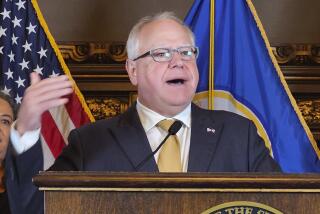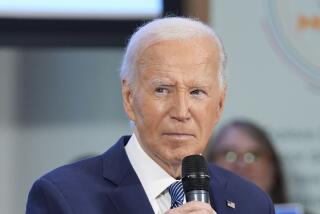The Organization Man
- Share via
WASHINGTON — If the 1988 Republican presidential race fulfills its recent promises of degenerating into bitter, drawn-out warfare, Sen. Bob Dole of Kansas may remember the New Hampshire primary as a latter-day Gettysburg--the critical battle where he could have won a decisive victory but failed. Tactically and logistically, Vice President George Bush now looks like the favorite; Dole armies face uphill terrain.
Part of Dole’s weakness lies in his waspish demeanor, in his unfortunate inability so far to develop a presidential personality to match his governmental expertise. And part of the new GOP equation also reflects Bush’s greater organizational depth in the upcoming March-April primaries, particularly Dixie’s March 8 Super Tuesday contests.
Yet some of Dole’s predicament simply reflects the institutional aspect of his task: the challenge of somehow convincing hierarchical, generally loyalist Republican voters to spurn a sitting vice president with decent poll ratings and a satchelful of party IOUs--and in the process partially turn their backs on Ronald Reagan and his political legacy. It’s something Republicans don’t do lightly; in mid-Depression 1932 the GOP renominated hapless President Herbert Hoover with barely a whimper (and also with barely a prayer in the general election).
Victory in New Hampshire made the precedents for Bush even more auspicious. Over the last half-century, whenever an early GOP front-runner won New Hampshire, he invariably went on to win nomination: Dwight D. Eisenhower, then Richard M. Nixon, Gerald R. Ford and Reagan. Even more to the point, Republican voters have no history of abandoning a front-runner who’s been a solid late-winter favorite, both in party rank-and-file preference surveys and also in general election match-ups with leading Democrats.
All this should make Bush the easy nominee. And the March-April shift to states where the vice president has a solid organizational edge also helps.
But there are caveats, too--and criticisms that could be potentially effective for a daring rival. The big political book of 1988 may be historian Paul Kennedy’s “Rise and Fall of the Great Powers,” with its implicit message that the United States is going the way of the British Empire earlier in this century. Reagan’s naive 1984 slogan, “Morning Again in America,” has become a cruel irony.
Public awareness of America’s global predicament, now beginning to spread rapidly, may emerge as a central theme in this year’s debate. Opinion polls have begun confirming the electorate’s jitters. An early February sampling for Newsweek found skittish Americans favoring tougher restraints on imports and reduced U.S. funding to defend rich Asian countries. A late-January CNN poll found a surprising plurality of Americans identifying the U.S. economy as weaker now than it was when Reagan took office in 1981. Such perceptions are dangerous for heir-apparent Bush. A bold GOP challenger would raise these themes now instead of letting the Administration play ostrich through autumn.
Then there is Bush’s unusual personal vulnerability. He’s the first vice president to be drawn in invisible ink for a prominent national cartoon strip. He’s the first to suffer a national news weekly cover story on the “Wimp Factor.” And he’s the first former Central Intelligence Agency director to seek the Oval Office--also the first presidential contender to have been involved in a major foreign-policy scandal.
When survey-takers ask the electorate what Bush knew about the Iran-Contra mess, some 50%-75% answer that he knew more than he has admitted. And the former CIA director may also have some other dirty laundry in his closet. On the day of the New Hampshire primary, a major U.S. newspaper noted that lawyers for the Panamanian strongman, Brig. Gen. Manuel A. Noriega, just indicted by two Florida grand juries on drug and racketeering charges, had brought to Miami files they called “political dynamite” for the U.S. presidential race. The incendiary subject matter: links between Bush and Noriega. To an unknowable extent, Bush’s CIA background and Iran-Contra exposure make him a conceivable time bomb for the August GOP national convention. One explosive revelation could doom his candidacy. That, too, ought be tossed into the 1988 debate among Republican decision-makers.
This ongoing Iran-Contra vulnerability was what prompted former GOP Secretary of State Alexander M. Haig Jr. to call Bush unelectable two weeks ago. Maybe so. Maybe not. The local disbelief that helped beat Bush in Iowa--a cockpit of skepticism about this Administration--counted for little in New Hampshire, New England’s regional refugee camp for conservative stalwarts.
Republicans, too, are divided on the Administration. First, Iowa gave an unusual advantage to Dole, the Republican most closely linked to doubts about Reagan’s economic policy and Iran-Contra machinations. Then came very different New Hampshire, where GOP voters showed their unusual bias for the major candidate (Bush) most closely linked to Ronald Reagan and the President’s anti-tax fervor. That’s why Dole may have had, and has now blown, a once-in-a-campaign opportunity--to ride Iowa momentum through a surprised New Hampshire.
Now that brief window of extreme Bush vulnerability has been shut. The next rounds of GOP primaries and caucuses are more representative. Today’s question is whether Dole has enough favorable terrain still ahead to map out George Bush’s multiple negatives and remind Republican voters that being second banana for eight years rarely wins in November. The last sitting vice president to be elected to the White House was Martin Van Buren in 1836. Right now, polls show lopsided 55%-60% national voter preference for a President who will move the country in new directions rather than continue Reagan policies, not normally a vice presidential job description. Even 25%-40% of Republicans agree. Yet there are personal and strategic reasons to wonder how much real Dole opportunity remains.
The personal reason is that Dole’s behavior in New Hampshire has reopened doubts about his own temperament and acidity.
The Kansas senator still has some opportunities in states on the pre-Super Tuesday list--Minnesota and South Dakota on Feb. 23, Vermont on March 1. But if Dole can’t rebuild momentum in these contests (where Bush strategists are busy trying to numb media attention), Dole will be heading south for Super Tuesday as a distinct underdog in Bush’s strongest region. After March 8, the race shifts to big-state primaries, such as Illinois and New York, where Dole is also heavily outgunned by Bush’s organization. So if the Senate GOP leader can’t quickly focus on issues and Administration weaknesses that begin to stagger George Bush--presumably via TV ads to avoid his own tendencies toward overkill--he could soon find the contest beyond reach.
Institutional and ideological boldness may also be pivotal. The Senate Republican leader’s strength, after eight years of a GOP Administration now losing glitter, is his policies--a well-documented dissent from the excesses of Reaganomics and an ability to deal with Congress, including a greater appeal and outreach to Democrats. They combine to make Dole by many estimates the most electable Republican for 1988.
In sharp contrast to Bush, Bob Dole represents partial dissent from Reaganism, exactly what the GOP needs at this late stage of the conservative political cycle when public demands for new directions are rising. Alas for Dole, his non-visionary nature has made it difficult to package and proclaim these political advantages affirmatively--not least as an offset to his sometimes harsh personality. Yet at this point, given Dole’s organizational weaknesses, it’s hard to see what options he has other than fresh policy directions and hard-hitting amplifications of George Bush weaknesses. Nobody’s going to elect Dole for his Administration fidelity--or for his warm, cuddly personality.
Besides, if Dole’s tough approach fails to win the nomination, or fails to reshape the vice president’s campaign in new and more courageous directions, any damage to Bush might not be all that counterproductive for the GOP--at least from a Machiavellian perspective.
Many Washington observers believe that the side that wins in 1988--taking power as the accumulating problems of the last 15 years come home to roost--will fumble and be out of office for a decade thereafter. It’s a valid concern. For Republicans, the problems of successfully managing a third term could be especially challenging. And one of the merits of a hard-hitting March-April Dole campaign, laying bare George Bush’s personal and institutional weaknesses, might be to increase the likelihood that either Bush toughens up and confronts these pitfalls or the electorate hands the White House over to a Democrat. Anybody who doesn’t think that “losing” is a frequently discussed 1988 strategic option isn’t familiar with the sotto-voce discussions of senior people in both parties.
More to Read
Get the L.A. Times Politics newsletter
Deeply reported insights into legislation, politics and policy from Sacramento, Washington and beyond. In your inbox twice per week.
You may occasionally receive promotional content from the Los Angeles Times.








